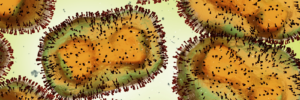Project
Last Updated on February 27, 2025

“We are not safe from emerging or re-emerging diseases including animal-to-human spillovers,” said Woldegebriel Assefa Woldegerima. “Our research will provide valuable insights for preventive public health strategies and help governments be better prepared to manage and respond to an epidemic or pandemic threat in the future.”
Mpox, more commonly known as monkeypox, is a virus spread through close contact including sexual interactions and is typically found in parts of central and western Africa. The 2022 outbreak was reported in early May that year. A total of 87,479 cases, including 140 deaths, have been confirmed in 111 countries as of May 2023, according to the World Health Organization.
Woldegerima and his research team will conduct risk-map assessments, geospatial analysis and machine learning to identify hotspots for potential outbreaks around the world. In addition, their research will use biobehavioural data and results of a survey by the Centre for Disease Control that involved men who have sex with men – a population considered at higher risk for infection – to examine control measures, risk factors and the impact mpox has had on sexually transmitted and blood-borne infections.
These various data sources will allow the researchers to extend their mathematical models for the first time to account for how the virus has disproportionately affected people living with HIV, who make up almost half of the global cases, and to better understand how HIV stigma and discrimination may impede public health interventions.
The work will provide new training opportunities for postdoctoral researchers and undergraduate students in the Faculty of Science and builds on York University’s expertise in the mathematical modelling of infectious diseases. York is among the top institutions in Canada for publications on COVID-19 modelling.
Woldegerima’s team for the CIHR research project includes Professors Jianhong Wu, James Orbinski, Sarah Flicker, Ali Asgary, Jude Kong, Nicola L. Bragazzi and Nickolas Ogden. The project is supported by two Organized Research Units at York, Y-EMERGE and Dahdaleh Institute for Global Health Research, which will provide in-kind support in the form of office space and administrative support.
Woldegerima’s project, “Modelling, predicting and risk assessment of mpox and other (re)emerging zoonotic threats to inform decision-making and public health actions,” received $480,000 from Canadian Institute of Health Research (CIHR).
Themes | Global Health Foresighting |
Status | Concluded |
Related Work |
N/A
|
Updates | |
People |
Sarah Flicker, Faculty Fellow, Faculty of Environmental and Urban Change - Active
Jude Kong, Faculty Fellow, Faculty of Science - Active Jianhong Wu, Faculty Fellow, Faculty of Science - Active Ali Asgary, Faculty Fellow, Faculty of Liberal Arts & Professional Studies - Active |
You may also be interested in...
Recap – Book Launch Playing for Real, with Paul Hogan
A book launch was held for DI community fellow Paul Hogan's book, Playing for Real on December 10, 2022. The book was commissioned by Di director James Orbinski for Paul to develop a curriculum based book as ...Read more about this Post
Recap – Fall 2022 Graduate Research by Dahdaleh Global Health Scholars
The Dahdaleh Institute proudly supports graduate research and scholarly and creative activities in line with the three themes of planetary health, humanitarianism, and foresighting at York University. We held our 3rd Annual Global Health Graduate ...Read more about this Post
World Health Assembly Simulation
The World Health Assembly Simulation (WHA SIM) is an unprecedented and exclusive opportunity that has been meticulously crafted by the esteemed School of Global Health. This initiative has emerged in response to the ever-growing importance ...Read more about this Project
